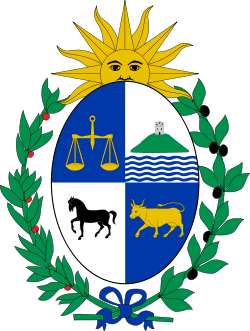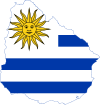Law of Uruguay
 |
| This article is part of a series on the politics and government of Uruguay |
|
Legislative |
|
| Foreign relations |
|
See also |
The legal system of Uruguay belongs to the Continental Law tradition.
The basis for its public law is the 1967 Constitution, amended in 1989, 1994, 1996, and 2004. According to it, Uruguay is a democratic republic. There is a clear separation of functions, between the President of the Republic, the Legislative Power and the Judiciary.[1]
On the other hand, private relationships are governed by the Uruguayan Civil Code, which was first published in 1868, thanks to the work of Tristán Narvaja.[2]
See also
References
- ↑ Constitution of Uruguay (Spanish)
- ↑ Uruguayan Civil Code (Spanish)
External links
- Search laws by number - Parliament of Uruguay (Spanish)
- IMPO - National Directorate of Official Publications (Spanish)
- Legal Framework - Office of the President (Spanish)
- El Derecho Digital (Spanish)
- La Ley Online (Spanish)
This article is issued from Wikipedia - version of the 7/20/2015. The text is available under the Creative Commons Attribution/Share Alike but additional terms may apply for the media files.
